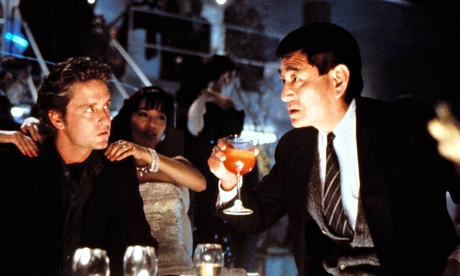
Ken Takakura, who has died aged 83, was one of the great names of Japanese cinema, as well as probably its best-known body. His bare, tattooed torso adorned cinema posters throughout the length and breadth of Japan from the late 1950s onwards and he starred in more than 200 films. He also had considerable success abroad in the 1960s and 70s, when Japanese film dominated the popular foreign film market, and his Hollywood films included Sydney Pollack’s The Yakuza (1974) and Ridley Scott’s Black Rain (1989).
He was born Goichi Oda, in the city of Nakama, in Fukuoka prefecture, and educated at the prestigious Meiji University, Tokyo. He had recently graduated and was in the process of applying for a lifelong “salaryman” position at the Toei film company in Toyko when, on the lot, he entered an audition on impulse. His first film was released in 1956, and he was immediately cast in action films, under the name Ken Takakura. In 1958 he starred in the director Tomu Uchida’s The Outsiders, a story set in the northern island of Hokkaido that put the minority Ainu people at the centre of the drama.
But his studio, Toei, devoted its efforts to promoting him in its new ninkyo genre of yakuza (or gangster) films. Ninkyo is generally translated as “chivalrous”. In films such as Tales of Showa Era Chivalry (1965), one of a long‑running series, Takakura depicts an older, and, we are persuaded, more honourable gangsters’ code. Ninkyo films pit defenders of the weak against the machinations of the powerful and feature depictions of masculinity with an appeal that is not only heterosexual.
These films, shot in studios and set in the recent past in cities such as Tokyo, rapidly became popular. Takakura would play the outsider with the patience and heart to right a wrong. This he would eventually do, not with an elegant display of skill with his blade, but a willingness to take horrific levels of injury. In publicity stills, if he is shown with a woman, he usually has his back to her in a way that suggests singularity of purpose and even chastity. He would be stripped to the waist for a final showdown, with his tattoo visible, marking him as someone outside mainstream society.
The identity of the ninkyo genre seems inseparable from Takakura and relates not just to his physical appeal but to a sense of male esteem that some saw threatened in a rapidly developing society and modernising workplace. He epitomised an idea of rebellion in a broad swath of society – the songs from his films were sung on the student barricades of the 60s and 70s.
When yakuza films changed to emphasise a lack of chivalry, Takakura was more likely to be found in other genres. In the much-admired A Fugitive from the Past (1965), also by Uchida, he played the part of the investigating police officer who ultimately fails to uncover the wartime identity of another protagonist.
But in that year, he also starred in the film Abashiri Prison, the first in a stream of action films that also had considerable success abroad. Abashiri is a real prison, located at the northern tip of Hokkaido. Its setting in remote unspoilt lands had a practical appeal for the studio. Period films, jidai geki, were proving increasingly difficult and expensive to mount as TV antennae, concrete and bitumen spread across the Japanese landscape. Technology was making it more viable to shoot action films on location, often using the wide, scope format. The Abashiri prison series provided all that and offered a range of underdog characters with whom viewers could identify.
The reach of Japanese action films in this period spread Takakura’s fame to Hollywood, and he found himself in demand there. Pollack’s The Yakuza was a gangster film starring Robert Mitchum as a detective who travels to Japan to help a friend involved with the yakuza and seeks help from an acquaintance, played by Takakura. In Black Rain, he was a Japanese police officer, Masahiro, assisting two New York cops (Michael Douglas and Andy Garcia) in pursuit of an escaped killer. Takakura as Masahiro, responding to the casual insults of the Americans towards their hosts, had the memorable line: “I do speak fucking English.” He also added appeal to the 1992 comedy Mr Baseball, in which Tom Selleck plays an ageing baseball player who joins a Japanese team, with Takakura as his manager.
Takakura’s fame abroad was not confined to the west. His yakuza and action films were also popular in the Chinese-speaking diaspora and latterly in China itself. The Chinese director Zhang Yimou was a longtime admirer of Takakura’s work and chose him to star in Riding Alone for Thousands of Miles (2005).
From 1959 until their divorce in 1971 Takakura was married to the singer Chiemi Eri.
• Ken Takakura (Goichi Oda), actor, born 16 February 1931; died 10 November 2014

